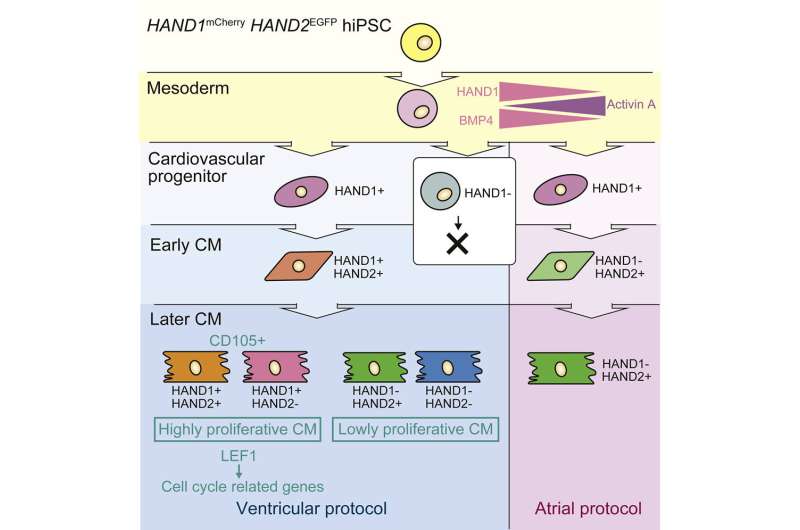Graphical abstract. Credit: DOI: 10.1016/j.stemcr.2021.06.014
Heart disease has long been the leading cause of death globally. One reason is that the heart has poor regenerative properties, causing damage to accumulate. Scientists have speculated that understanding how the heart grows from the embryo will lead to new medical treatments. To model the development of heart cells, a new study in Stem Cell Reports by CiRA researchers uses human iPS cells to show the importance of three genes: HAND1, HAND2 and LEF1.
The heart can be divided into several structures, including the left and right ventricles, the aorta and the outflow tract. Mutations in Hand1 and Hand2 are known to cause defective growth in specific heart structures of the mouse. Human hearts also show disturbed development with HAND1 and HAND2 mutations, but far less is known about how the two genes regulate the human heart.
"We know a lot about Hand1 and Hand2 in heart development in the mouse. But understanding their role in the human heart is difficult because of the limited number of human cell sources," said CiRA Associate Professor Yoshinori Yoshida, who managed the study.
Applying these protocols, the study shows that HAND1 is crucial for the generation of cardiomyocytes from iPS cells.
"We found a gene network that includes HAND1, HAND2 and LEF1 controls cardiomyocyte proliferation," said Chikako Okubo, the first author of the paper. LEF1 is a gene involved in growth and cancer.
Okubo and colleagues also showed that the effects of these three genes come from them binding directly to one another.
"We found these three genes regulated the cell cycle of cardiomyocytes and their proliferation," she said.
The researchers expect these findings to both improve the production of cardiomyocytes from iPS cells and act as molecular targets that stimulate cardiomyocyte proliferation in cell therapies for the heart.
More information: Chikako Okubo et al, Expression dynamics of HAND1/2 in in vitro human cardiomyocyte differentiation, Stem Cell Reports (2021). DOI: 10.1016/j.stemcr.2021.06.014
Journal information: Stem Cell Reports
Provided by Kyoto University























